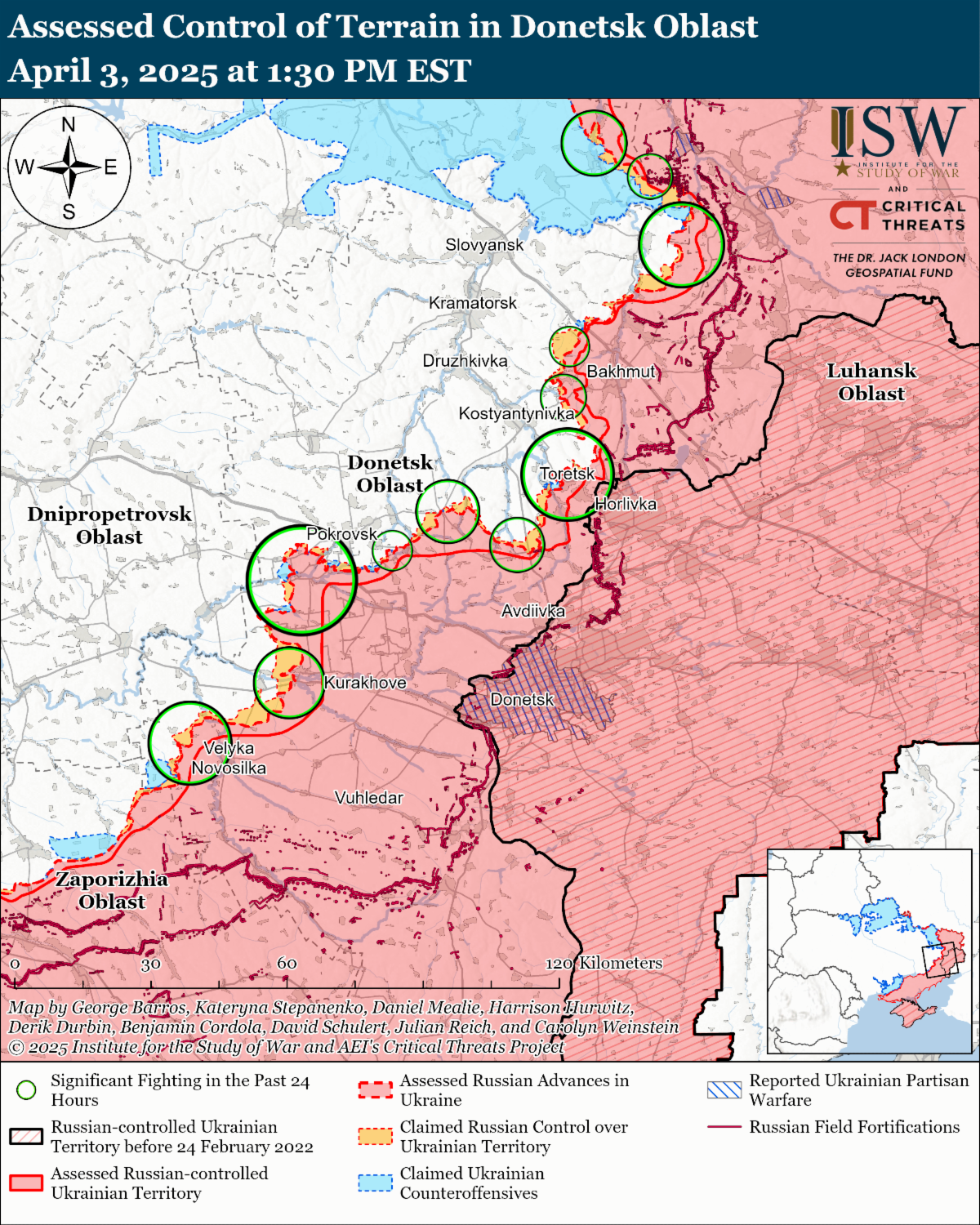Russia seeks to leverage ongoing ceasefire and future peace negotiations to seize large amounts of territory in Ukraine and install a pro-Russian puppet government in Kyiv but will likely continue military operations in Ukraine if the Kremlin is unable to achieve a full Ukrainian surrender through diplomacy. Bloomberg reported on April 3, according to sources in Moscow familiar with the matter, that the Kremlin is "counting on US President Donald Trump to deliver an acceptable peace deal in Ukraine," but is prepared to continue the war if it is not able to secure its goals through negotiations with the United States. The sources also claimed that the Kremlin is not concerned by Trump's recent statement that the United States is willing to introduce additional sanctions targeting Russian oil and secondary sanctions against buyers of Russian oil if Russian President Vladimir Putin does not make progress towards a general ceasefire. The US Office of the Director of National Intelligence's (ODNI) 2025 Annual Threat Assessment stated that Russia is leveraging its control of the theater-wide initiative and ongoing political and information efforts amid negotiations to end the war in Ukraine to achieve significant concessions from Ukraine and the West. The ODNI report assessed that Putin is "probably" more willing to incur the risks of a longer war than to agree to an end to the war that is unfavorable to Russia. The ODNI report further assessed that Putin "appears resolved and prepared to pay a very high price to prevail in what he sees as a defining time in Russia’s strategic competition with the United States, world history, and his personal legacy." The ODNI assessment that Putin remains committed to pursuing Ukrainian surrender through both diplomatic and military means is consistent with ISW's assessment that Putin is leveraging ongoing negotiations to secure additional concessions from Ukraine and the West as part of its long-term pursuit of total Ukrainian surrender.
Russia is facing significant military and economic challenges that could seriously compromise Russia's ability to wage its war in Ukraine, factors that could increase the Kremlin's desire to accomplish its objectives in a mediated ceasefire or peace negotiation in the short-term if possible. The ODNI report assessed that Russia has suffered significant casualties in Ukraine and that Russia must contend with the poor quality of its new recruits. The ODNI report assessed that the Russian economy is facing significant challenges as Russia continues to balance resource allocation between defense industrial production and civilian sectors. US European Command (EUCOM) Commander and NATO Supreme Allied Commander Europe (SACEUR) General Christopher Cavoli stated on April 3 that Russian forces have lost over 4,000 tanks in Ukraine. Cavoli stated that Russia started the war with a total of 13,000 tanks and are "starting to approach near the end" of the viable tanks in storage. Cavoli noted that Russia has expanded its capability to produce shells, cruise missiles, and first-person view (FPV) drones and that Russia is preparing either to continue offensive operations in Ukraine or to launch a future campaign against a NATO member state. Cavoli stated that the war in Ukraine has "distorted" the Russian economy and "turbocharged" the Russian defense industry at the expense of Russia's civilian economic sector and that it may be difficult for Russia to "unwind" this imbalance. Cavoli assessed that Russia will be able to replace the significant personnel losses incurred in Ukraine ahead of a future conflict in Europe but noted that Russia's ability to replace materiel losses is contingent on Ukraine's ability to inflict greater losses. ISW previously noted that Russia's ongoing and forecasted economic struggles are closely tied to Russian losses on the battlefield and that it is not possible for the United States or the wider West to exert maximum pressure on Russia with economic tools alone. The United States can leverage Russian vulnerabilities and achieve a stronger negotiating position by continuing — or increasing — military aid to Ukraine such that Ukrainian forces can continue to inflict significant manpower and materiel losses on Russia.
Key Takeaways:
- Russia seeks to leverage ongoing ceasefire and future peace negotiations to seize large amounts of territory in Ukraine and install a pro-Russian puppet government in Kyiv but will likely continue military operations in Ukraine if the Kremlin is unable to achieve a full Ukrainian surrender through diplomacy.
- Russia is facing significant military and economic challenges that could seriously compromise Russia's ability to wage its war in Ukraine, factors that could increase the Kremlin's desire to accomplish its objectives in a mediated ceasefire or peace negotiation in the short-term if possible.
- The US Treasury Department announced on April 2 that the United States lifted sanctions on Karina Rotenberg, the wife of Russian businessman and oligarch Boris Rotenberg.
- Ukrainian forces advanced near Pokrovsk. Russian forces advanced in Kursk and Belgorod and near Lyman, Toretsk, Kurakhove, and Velyka Novosilka.
- The Russian State Duma adopted a bill on April 3 to grant veteran status to Russian military personnel and volunteer formations that fought in Kursk Oblast.
| 




 [ISW] 이란 업데이트, 2025년 4월 3일
[ISW] 이란 업데이트, 2025년 4월 3일
 [ISW] 러시아 점령 업데이트, 2025년 4월 3일
[ISW] 러시아 점령 업데이트, 2025년 4월 3일